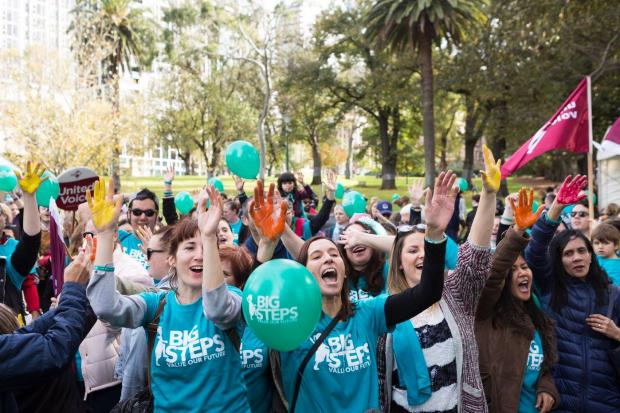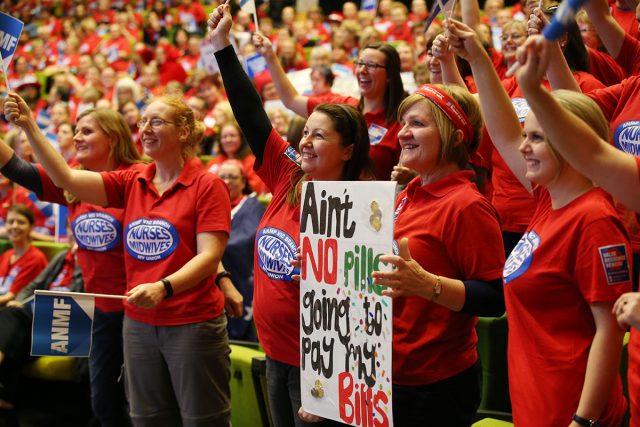International Women’s Day
Written by: on
March 8 is the International Women’s Day. For more than 120 years on this day working women around the world come together to commemorate and celebrate working women’s long struggles and achievements for the rights of women to economic and social equality and an end to the capitalist exploitation.
We honour the millions of working class women around the world fighting against corporate and imperialist ruling class domination and imperialist wars. We stand in solidarity with women fighting for independence and socialism for their people and countries.
The underlying class basis of exploitation of women
International Working Women’s Day is much more than a celebration of past struggles and achievements won by working women.
International Working Women’s Day links the present demands and struggles for equal rights, justice, respect for women and an end to the exploitation of working women, to the movement for a socialist system where women can fully develop and realise their rights and potential. We fight for immediate demands that lessen the heavy burden of capitalism on working women and to strengthen our collective power in the long fight for fundamental change.
Aboriginal women of Australia continue their fight against oppression and exploitation imported by the British invasion and occupation of the country 240 years ago. In 1880 Aboriginal women at Coranderrk station defied the white manager’s orders and went on strike demanding that they be paid in wages, not sugar and flour. (See Vanguard article 8 March 2016.) This fight is continuing today by the First People, including the young militant Warriors of the Aboriginal Resistance.
For more than 100 years working women in Australia have fought without let-up for equal pay and decent working conditions, affordable and quality child care, workers’ rights, respect and safety in the workplace, community and at home; against sexual harassment and assault, discrimination and domestic violence.
Women’s persistent struggles have won some limited relief. However, most gains have proven to be temporary and tenuous, eroded or vanished in the past 25 years under constant pressure and demands by capital to intensify exploitation, and increase profits. Child care is again unaffordable for many working women, equal pay for work of equal value has not been realised. Sole parents women live on or below the poverty line, attacked by both major parliamentary parties, relentlessly hounded and demonised by the government bureaucracy, often unable to pay for housing, their children’s education and power bills. Public spending on welfare payments and community services like affordable child care and the health needs of women are constantly cut back, while people’s taxes are syphoned off to multinational corporations.
Legislation on equal opportunity, sex discrimination, sexual harassment and bullying, maternity leave and child care leave entitlements and other rights and provisions that women had fought for and won, are often scraps of paper, unenforceable. In reality they have proven to be mainly window dressing. Under capitalism, the overriding needs of capital to maximise profits from intensified exploitation of workers takes precedence over the rights and wellbeing of working people.
In the meantime, the harsh anti-worker industrial relations laws are swiftly and viciously enforced by the full weight of the capitalist legal system against working women and men and their unions for taking action to defend their rights, wages, safety on the job and solidarity with other workers.
In the late 1960s and 1970s, during the unstoppable tsunami of struggle for women’s rights, capitalism in that historical period had some economic capacity to make a few minor concessions and diverted the struggle away from working class women’s fundamentally far reaching economic and social demands. Capital co-opted some of the women’s struggles that didn’t challenge its own existence. The working class origin and content of working class demands and struggles which were taken up by the founding women of the International Working Women’s Day were pushed aside.
 This year’s IWD is taking place on the eve of a nation-wide mass walk out and protests by early childhood educators across the country on 26 March. It’s been a long struggle by early childhood educators and their union, United Voice, fighting to win equal pay for low paid women workers. On 6 March, in a disgraceful ruling, the Fair Work Commission rejected early childhood educators’ application to increase their pay above $21 per hour.
This year’s IWD is taking place on the eve of a nation-wide mass walk out and protests by early childhood educators across the country on 26 March. It’s been a long struggle by early childhood educators and their union, United Voice, fighting to win equal pay for low paid women workers. On 6 March, in a disgraceful ruling, the Fair Work Commission rejected early childhood educators’ application to increase their pay above $21 per hour.
“The Fair Work Commission has failed us. They failed to hear from a single educator about what it’s like to live on half the average wage.
Early educators are qualified, trusted and have a huge responsibility caring for and educating the very youngest members of our community. Yet they can be paid as little as $21 an hour. After years of fighting for pay equity, early childhood educators have had enough. It is not acceptable that educators can be paid as little as $21 an hour.”
Working class women are doubly exploited by capitalism. At work women, like all workers, create the surplus value from where profit is extracted and kept by the boss class. At home, women provide unpaid labour for the capitalist class. We do unpaid work as society’s primary carers of children, who are the next generation of labour for the capitalist class to exploit. Women’s unpaid work at home re-produces and maintains the present and future generations of workers at no cost to the exploiting class. Women look after the society’s elderly and the sick with little financial or material support from the state.
The double exploitation of women economically, socially and culturally is imbedded in the exploitative system of capitalism which depends on the unpaid labour of women at home and raising the next generation of workers for exploitation. This economic exploitation and inequality of women is reinforced and promoted by the mainstream culture of abuse, degradation and violence against women.
For communist and socialist women, the struggle for gender equality and an end to the economic, social and cultural exploitation of women is inseparably linked to the working class struggle for socialism.
Print Version - new window Email article
-----
Go back
Independence from Imperialism
People's Rights & Liberties
Community and Environment
Marxism Today
International
Articles
| Public sector workers take on SA government |
| Courts uphold government attack on militant union |
| Support BAE shipworkers’ action for same job, same pay |
| Labor Sweeps to Power: Now It’s Time to Deliver for Workers |
| Dystopia and the Sacrosanct Elephant |
| Workers Strike at PepsiCo's Snack Foods Factory - An Example of The Leading Class In Action |
| ALBANESE DEFINES LABOR PARTY - "MAINSTREAM" and "REFORMIST NOT REVOLUTIONARY" |
| May Day Greetings from CPA (M-L) |
| NSW construction workers to march on May 1 |
| The Not-So Curious Incident of Low Wages Growth - Peetz report |
| VALE Wallace McKitrick: cultural fighter (1950-2025) |
| Don’t leave politics to the politicians! |
| SA Government Workers in Action in Struggle Against Rising Cost of Living |
| 8th March - International Women’s Day - Salute Women’s Struggle |
| Book Review: Culture and Imperialism |
| A Capitalist Parliament Won’t Get People Out of the Mess - Mass Struggle for People’s Power the only Solution to the Crisis |
| Unions say "Don't risk Dutton" but avoid issues of substance |
| Canberra airport guards fight for job security while overseas owned security contractors compete in "race to the bottom" at privatized airports |
| Union membership and workers’ struggle |
| Woolworths Warehouse Workers' Strike Shows Strength of United Workers |
-----

